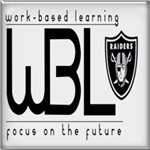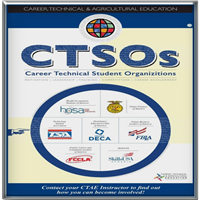- East Paulding High School
- CTAE Department
-

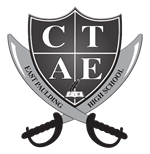
Welcome!
Welcome to East Paulding High School CTAE department! Here we will provide information about the CTAE teachers, classes, programs, and organizations. The CTAE department strives to engage all students in active and participatory learning with the goal of creating elite students, informed and engaged citizens, and life-long learners.
Our Pledge:
Our pledge is that every teacher in the CTAE department is committed to trying his/her best to help your child grow as a student and a person. At the end of a school year, in addition to knowing more about the subject of a particular class, our students should be better at:- conducting research through multiple mediums
- constructing written arguments using supporting evidence
- determining fact from opinion
- determining the bias of information sources
- determining the main idea of an article, video or film
- engaging in discussion with peers
- enjoying the study of various areas of science
- explaining current events with scientific background
- keeping aware of community issues and concerns
- knowing how to be a focused and contributing group member
- planning for college and career life
- listening during discussions, lectures, group work, etc.
- planning and time management
- retaining information
- seeing the connection between subject matter and their lives
- speaking publicly to small or large audiences
- taking notes in class and at home
- taking tests and various formal assessments
- truly wanting to know more about class subjects
- using the internet critically and productively
- using libraries and computer labs effectively
- voicing opinions and ideas to community leaders
Career pathways are state-approved career enhancement programs defined as a coherent, articulated sequence of rigorous academic and career-related courses usually commencing in the ninth grade and leading to an associate degree, and/or an industry-recognized certificate or licensure, and/or a baccalaureate degree and beyond.
Career, Technical and Agricultural Education (CTAE) provides all Georgia students with the opportunity to select at least three sequenced electives in a career pathway, along with recommended academic coursework, to prepare them to continue their education at any level or enter the world of work.
Selection of a pathway will be based on self-awareness and the investigation of occupations plus related educational levels aligned with the pathway. Most high-demand, high-skilled, high-wage occupations in all concentrations still require education beyond high school. Implementation of career pathways is a collaborative effort between the local system, the Technical College System of Georgia and the University System of Georgia.
-
Note: All teachers are available for tutoring. Check with your teacher for their tutoring times.
CTAE Department

Halie Bissell - ✉
Department Chair
Marketing Principles
Marketing & Entrepreneurship
Marketing Management

Leon Bowers - ✉
Intro to Software Technology
Computer Science Principles
Work-Based Learning (WBL)
Liam Buckley - ✉
Intro to Healthcare Science
Sports Medicine
Kyle Chapman - ✉
Basic Ag Science
Forest Science
Wildlife Management
Megan Dupree - ✉
Marketing Principles
Intro Sports Entertainment Marketing
Advanced Sports Entertainment Marketing

Joseph Fouts - ✉
Audio, Video Tech & Film I
Audio, Video Tech & Film II
Audio, Video Tech & Film III
Kathy Gerau - ✉
Intro to Graphics & Design
Graphic Design & Production
Advanced Graphic Design
April Goodson - ✉
Intro Personal Care Services
Cosmetology II
Cosmetology III
Casey Hall - ✉
Exam Teaching Profession
MSgt. Tanya Hagarman - ✉
A/O Science Leadership 100
A/O Science Leadership 200
A/O Science Leadership 300
A/O Science Leadership 400
A/O Science Cultural Studies
A/O Science Survival
Bryan Jacobson - ✉
Intro to Business & Technology
Business & Technology
Business Communication
Zack Kilday - ✉
Intro to Healthcare Science
Essentials of Healthcare
Allied Health & Medicine
MSgt. Stan Parker - ✉
A/O Science Leadership 100
A/O Science Leadership 200
A/O Science Leadership 300
A/O Science Leadership 400
A/O Science Cultural Studies
Flight Science
Masude Sayedzada - ✉
Automotive Technologies I
Automotive Technologies II
Automotive Technologies III
Keesha Walker - ✉
Intro to Culinary Arts
Culinary Arts I
Culinary Arts II
Arthur Wilson - ✉
Intro to Drafting & Design
Arch Drawing & Design I
Arch Drawing & Design II
-
Pathway Offerings Air Force (JROTC) 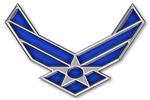
Aerospace Leadership: Citizenship 100
Introduces cadets to the Air Force Junior Reserve Officer Training Corps (AFJROTC) program, providing a basis for progression through the rest of the AFJROTC program while instilling elements of good citizenship. It contains sections on cadet and Air Force organizational structure; uniform wear; customs, courtesies, and other military traditions; health and wellness; fitness; individual self-control; and citizenship.
Required: No / Elective
Prerequisites: None
Credit: 1.0
Grades: 9 - 12Course #: 28.01100

Aerospace Leadership: Communication 200
Focuses on the Air Force Junior Reserve Officer Training Corp (AFJROTC) mission to “develop citizens of character dedicated to serving their nation and community.” This is accomplished through better communication, increased awareness of self and others, and improved leadership. Woven throughout the course is the underlying theme of developing personal integrity while emphasizing leadership and other values, such as service and excellence.
Required: No / Elective
Prerequisites: None
Credit: 1.0
Grades: 9 - 12Course #: 28.01200

Aerospace Leadership: Global & Cultural Studies 220
Cultural studies is a customized course that introduces students to the world’s cultures through the study of world affairs, regional studies, and cultural awareness. The course delves into history, geography, religions, languages, culture, political systems, social issues, economics, environmental concerns, and human rights. It looks at major events and significant figures who have shaped each region. An underlying theme of the course emphasizes the impact that cultural perspectives have on interactions between people.
Required: No / Elective
Prerequisites: None
Credit: 1.0
Grades: 9 - 12Course #: 28.01300

Aerospace Leadership: Career Exploration 300
focuses on the Air Force Junior Reserve Officer Training Corp (AFJROTC) mission of “building better citizens for America.” This is accomplished through excellence in citizenship, and through teaching the values of community service, responsibility, character, and self-discipline. The course is designed to equip students with essential life skills, focusing on educational and career paths. The underlying theme of the course emphasizes that responsibility in life skills supports good citizenship. Mid-Continent Research for Education and Learning (McREL) Correlated to McREL Standards for Life Work, Self-Regulation, Thinking and Reasoning, Working with Others, Behavioral Studies, and Language Arts.
Required: No / Elective
Prerequisites: None
Credit: 1.0
Grades: 9 - 12Course #: 28.01400

Aerospace Science: Exploring Space & Cyber 300
These standards include more abstract concepts such as principles of astronomy, characteristics of the solar system, components for space exploration, human space flight physiology, history and future of space exploration, space robotics, orbital and space flight physics, and mechanics. Students investigate aerospace science concepts through experiences in laboratories and field work using the science and engineering practices of asking questions and defining problems, developing and using models, planning and carrying out investigations, analyzing and interpreting data, using mathematics and computational thinking, constructing explanations and designing solutions, engaging in argument from evidence, and obtaining, evaluating, and communicating information.
Required: No / Elective
Prerequisites: None
Credit: 1.0
Grades: 9Course #: 28.01500

Aerospace Science: Management 400
Life Skills and Career Opportunities discusses principles of management. It includes definitions and histories of the discipline, conflict management, negotiation, and mentoring. It covers management techniques including principles and functions of management; management decisions involving conflict management, personal coping mechanisms, skills, roles, performance of management, and delegation; management functions of problem solving, decision making, negotiation, and mentoring, and managing one’s self and others by managing self- development, time, and information.
Required: No / Elective
Prerequisites: None
Credit: 1.0
Grades: 9Course #: 28.01600

Aerospace Science: Aviation History 100
This is an aviation history course focusing on the development of flight throughout the centuries. It starts with ancient civilizations and flight, then progresses through time to future developments in aerospace, with an introduction into cyber technologies. The intent of this course is to bring alive the significant discoveries in flight.
Required: No / Elective
Prerequisites: None
Credit: 1.0
Grades: 9Course #: 28.01700

Aerospace Science: Survival
Introduces students to the physical and mental needs individuals must satisfy during varied survival situation. Students learn about survival preparedness, conditions affection survival, individual survivor needs, psychological aspects of survival, and the will to survive. They also learn required personal protection measures, where to find necessities required to maintain life, and orientation and traveling techniques to use during a survival situation. Students will learn what to do to maintain life in a survival situation—whether that situation is caused by a natural or manmade disaster. They learn to quickly assess their environment, determine immediate and long-term actions for survival, and scientifically pursue survival in an unfamiliar environment.
Required: No / Elective
Prerequisites: None
Credit: 1.0
Grades: 9Course #: 28.01800

Aerospace Science: Honors Ground School
Aviation Honors Ground School is an advanced, more in-depth study of previous aerospace topics. The course is the foundation for students interested in receiving a private pilot’s license. Upon successful completion of this course, the student will be prepared to take the Federal Aviation Administration (FAA) Private Pilot Written Exam.
Required: No / Elective
Prerequisites: None
Credit: 1.0
Grades: 9Course #: 28.01900

Aerospace Leadership: Science of Flight 200
These standards include more abstract concepts such as principles and physics of flight, aircraft motion and control, flight propulsion, meteorology, weather elements affecting atmospheric flight, aviation weather forecasting, human flight physiology, navigation elements, navigation planning, flight instrumentation and navigation technology. Students investigate aerospace science concepts through experiences in laboratories and field work using the science and engineering practices of asking questions and defining problems, developing and using models, planning and carrying out investigations, analyzing and interpreting data, using mathematics and computational thinking, constructing explanations and designing solutions, engaging in argument from evidence, and obtaining, evaluating, and communicating information.
Required: No / Elective
Prerequisites: None
Credit: 1.0
Grades: 9 - 12Course #: 28.01910

Aerospace Leadership: Corps Management
Provides practical experience in principles of management. It includes actual opportunities for discipline, conflict management, negotiation, and mentoring. Cadets apply management techniques including principles and functions of management; make management decisions involving conflict management, personal coping mechanisms, skills, roles, performance of management, and delegation; and manage cadet problem solving, decision making, negotiation, and mentoring while learning to apply self-development, time, and information principles.
Required: No / Elective
Prerequisites: None
Credit: 1.0
Grades: 9 - 12Course #: 28.01920

Aerospace Leadership: Senior Project
The Senior Honors Project consists of three major components: (1) the research paper OR the physical project, (2) the portfolio, and (3) the Power Point presentation. The project must be completed in accordance with the AFJROTC Honors Manual found on the official AFJROTC Wings site. Additionally, students will prepare their project in accordance with the AFJROTC Honors ROTC Template, and instructors will evaluate the project according to the AFJROTC Honors Project Rubric.
Required: No / Elective
Prerequisites: None
Credit: 1.0
Grades: 12Course #: 28.01940
Architectural Drawing & Design (Industry Certified) 
Introduction to Drafting & Design
The Introduction to Drafting and Design course is the foundational course under the Architectural Drawing and Design pathway and prepares students for a pursuit of any career in the field of Drafting/Architecture. The course provides the basic knowledge of mathematically drawing objects to scale and the use of CAD.
Required: No / Elective
Prerequisites: None
Credit: 1.0
Grades: 9-12Course #: 48.54100

Architectural Drawing & Design I
The Architectural Drawing & Design I course introduces students to the basic terminology, concepts, and principles of architectural design. Emphasis is placed on house designs, floor plans, roof designs, elevations (interior and exterior), schedules, and foundations. Students are introduced to Autodesk Revit Residential.
Required: No / Elective
Prerequisites: Introduction to Drafting and Design
Credit: 1.0
Grades: 10-12Course #: 48.54500

Architectural Drawing & Design II
Architectural Drawing & Design II is a course that builds on the skills developed in Architectural Drawing & Design I. Emphasis is placed on schedules, plumbing, heating and air, graphic presentations, plot/site plans, specifications, and building estimations. CAD tools and software are used extensively throughout the course. Students continue usage of Autodesk Revit Commercial.
Required: No / Elective
Prerequisites: Architectural Drawing & Design I
Credit: 1.0
Grades: 11-12Course #: 48.54600
Automotive Technologies (Industry Certified) 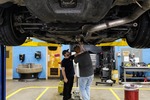
Automotive Technologies I
Students in this course will learn the basic skills needed to gain employment as a maintenance and light repair technician. Students will be exposed to courses in automotive preventative maintenance and servicing and replacing brakes and steering and suspension components. In addition, student will learn how to do general electrical system diagnosis, learn electrical theory, perform basic tests, and determine necessary action. In addition, students will learn how to evacuate and recharge air-conditioning systems using the proper refrigerant. The hours completed in this course are aligned with ASE/NATEF standards and are a base for the entry-level technician.
Required: No / Elective
Prerequisites: None
Credit: 1.0
Grades: 9-12Course #: 47.45000

Automotive Technologies II
Students will learn the basic skills needed to gain employment as a maintenance and light repair technician. The course will expose students to automotive preventative maintenance and servicing, as well as replacing brakes, and steering and suspension components. Students will also learn general electrical system diagnosis, electrical theory, basic test requirements, and determining necessary action. In addition, students will learn how to evacuate and recharge air conditioning systems using the proper refrigerant. Standards for this course are aligned with ASE/NATEF standards and are an excellent foundation for the entry-level technician.
Required: No / Elective
Prerequisites: None
Credit: 1.0
Grades: 10-12Course #: 47.45100

Automotive Technologies III
Students will learn the basic skills needed to gain employment as a maintenance and light repair technician and will expose student to automotive preventative maintenance and servicing, replacing brakes, as well as steering and suspension components. Students will learn about general electrical system diagnosis, electrical theory, basic tests that are required, and determine the necessary action. In addition, students will learn how to evacuate and recharge air-conditioning systems using the proper refrigerant. The standards in this course are aligned with ASE/NATEF standards and are an excellent foundation for the entry-level technician.
Required: No / Elective
Prerequisites: None
Credit: 1.0
Grades: 11-12Course #: 47.45200
Audio Video Technology & Film Pathway 
Audio Video Technology & Film I
This course will serve as the foundational course in the Audio & Video Technology & Film pathway. The course prepares students for employment or entry into a postsecondary education program in the audio and video technology career field. Topics covered may include, but are not limited to: terminology, safety, basic equipment, script writing, production teams, production and programming, lighting, recording and editing, studio production, and professional ethics.
Required: No / Elective
Prerequisites: None
Credit: 1.0
Grades: 9-12Course #: 10.51810

Audio Video Technology & Film II
This one credit course is the second in a series to prepare for a career in Broadcast/Video production and/or to transfer to a postsecondary program for further study. Topics include: Planning, Writing, Directing and Editing a Production; Field Equipment Functions; Operational Set-Up and Maintenance; Advanced Editing Operations; Studio Productions; Performance; Audio/Video Control Systems; Production Graphics; Career Opportunities; and Professional Ethics.
Required: No / Elective
Prerequisites: AV Tech & Film I
Credit: 1.0
Grades: 10-12Course #: 10.51910
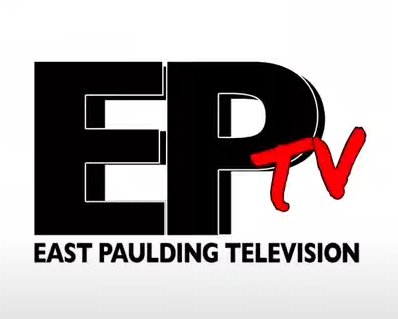
Audio Video Technology & Film III
This one credit transition course is designed to facilitate student-led broadcasts/videos under the guidance of the instructor. Students work cooperatively and independently in all phases of broadcast/video production.
Required: No / Elective
Prerequisites: AV Tech & Film II
Credit: 1.0
Grades: 11-12Course #: 10.52010
Business & Technology 
Introduction to Business & Technology
Designed to teach the basics of business technology, human resources, and entrepreneurship. Students will use computers to learn essentials for working in a business environment, managing a business, and owning a business. An emphasis will also be placed on professional communication skills and practices, problem solving, ethical and legal issues, and the impact of effective presentation skills.
Required: No / Elective
Prerequisites: None
Credit: 1.0
Grades: 9-12Course #: 07.44130

Business & Technology
This course is designed to prepare students with the knowledge and skills to be an asset to the collaborative, global, and innovative business world of today and tomorrow. Mastery use of spreadsheets and the ability to apply leadership skills to make informed business decisions will be a highlight of this course for students. Publishing industry appropriate documents to model effective communication and leadership will be demonstrated through project-based learning. Students will use spreadsheet and database software to manage data while analyzing, organizing and sharing data through visually appealing presentation. The prerequisite for this course is Introduction to Business and Technology.
Required: No / Elective
Prerequisites: Introduction to Business & Technology
Credit: 1.0
Grades: 10-12Course #: 07.44100

Business Communications
This course teaches students to create, edit, and publish professional-appearing business documents with clear and concise communication. Creative design, persuasive personal and professional communications will be applied through research, evaluation, validation, written, and oral communication. Leadership development and teamwork skills will be stressed as students work independently and collaboratively. Presentation skills will be developed and modeled for students’ master presentation software in this course. The prerequisites for this course are Introduction to Business and Technology and Business and Technology.
Required: No / Elective
Prerequisites: Business & Technology
Credit: 1.0
Grades: 11-12Course #: 07.45100
Culinary Arts Pathway 
Introduction to Culinary Arts
Designed to introduce students to fundamental food preparation terms, concepts, and methods in Culinary Arts where laboratory practice will parallel class work. Fundamental techniques, skills, and terminology are covered and mastered with an emphasis on basic kitchen and dining room safety, sanitation, equipment maintenance and operation procedures.
Required: No / Elective
Prerequisites: None
Credit: 1.0
Grades: 9-12Course #: 20.53100
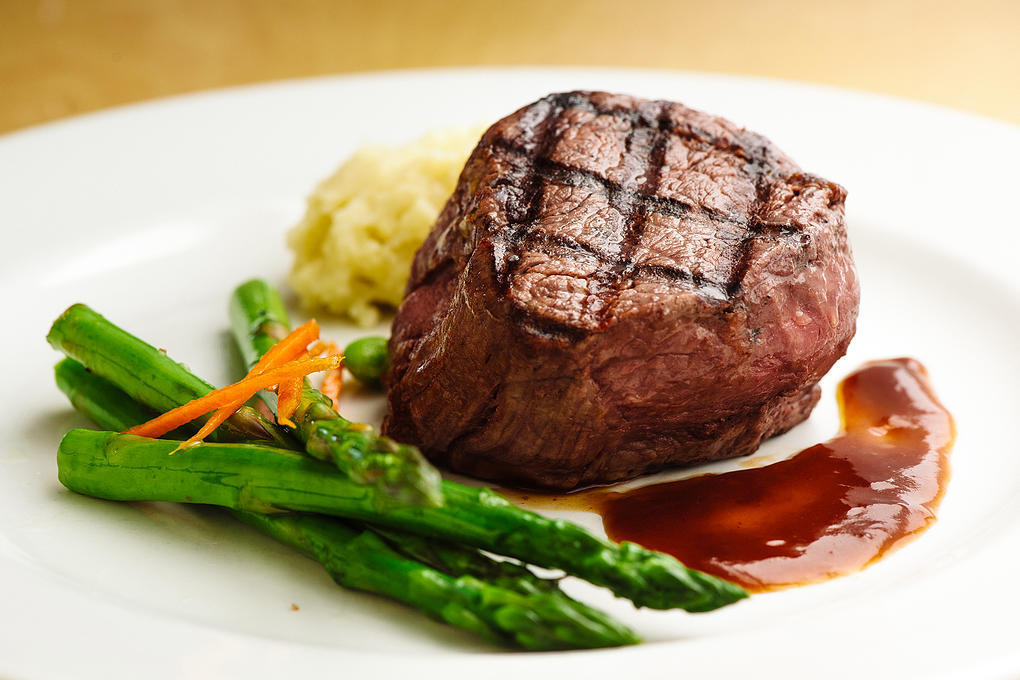
Culinary Arts I
Designed to create a complete foundation and understanding of Culinary Arts leading to post-secondary education or a foodservice career. Building from techniques and skills learned in Intro to Culinary Arts, this fundamentals course begins to involve in-depth knowledge and hands on skill mastery of Culinary Arts.
Required: No / Elective
Prerequisites: Intro to Culinary Arts
Credit: 1.0
Grades: 10-12Course #: 20.53210

Culinary Arts II
An advanced and rigorous in-depth course designed for the student who has continued in the Culinary Arts Pathway and wishes to continue their education at the post-secondary level or enter the foodservice industry as a proficient and well-rounded individual. Strong importance is given to refining hands on production of the classic fundamentals in the commercial kitchen.
Required: No / Elective
Prerequisites: Culinary Arts I
Credit: 1.0
Grades: 11-12Course #: 20.53310
Forestry / Wildlife Systems 
Basic Agricultural Science
This course is designed as an introduction or support course for the Agriscience Pathway Program of Study. The course introduces the major areas of scientific agricultural production and research; presents problem solving lessons and introductory skills and knowledge in agricultural science and agri-related technologies. Classroom and laboratory activities are supplemented through supervised agricultural experiences and leadership programs and activities.
Required: No / Elective
Prerequisites: None
Credit: 1.0
Grades: 9-12Course #: 02.47100

Forest Science
This course provides entry-level skills for employment in the forest industry and for further study. The course covers establishing forests by natural and artificial means, maintaining and surveying forests, identifying and protecting trees, practicing silviculture, measuring trees and land, mapping, preparing for timber sales and harvest, employing multiple-use resource management, keeping records, and figuring taxes. Classroom and laboratory activities are supplemented through supervised agricultural experiences and leadership programs and activities.
Required: No / Elective
Prerequisites: Basic Agricultural Science
Credit: 1.0
Grades: 10-12Course #: 03.45100
*Counts as 4th Science Credit.
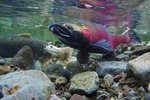
Wildlife Management
This course introduces students to the principles of wildlife management and conservation and to opportunities for further education and careers in the field of wildlife biology. The course includes instruction in the history of wildlife management, ecological concepts, habitat assessment, habitat management techniques for wildlife, population dynamics, predator-prey relationships, wildlife species biology and identification, human-wildlife conflict resolution, the role of hunting in conservation, game and fish laws and regulations, hunters safety, and the application of scientific principles to managing wildlife habitat and populations. Classroom and laboratory activities are supplemented through supervised agricultural experiences and leadership programs and activities.
Required: No / Elective
Prerequisites: None
Credit: 1.0
Grades: 11-12Course #: 03.45300
Graphic Design Pathway (Industry Certified) 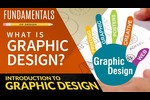
Introduction to Graphics & Design
This class is designed to provide an overview of the design and production of printed material. Students use a Macintosh computer platform that includes the Adobe Creative Suite software (InDesign, Illustrator, Photoshop, and Acrobat). Projects for the class include notepads, business cards, greeting cards, retouched/color corrected photos, booklets, brochures, logo design, cartoons, post cards, package design, etc. Related careers include printing, publishing, packaging, advertising, graphic design, illustration, photography and are often referred to as the graphic arts, print, or imaging industries.
Required: No / Elective
Prerequisites: None
Credit: 1.0
Grades: 9-12Course #: 48.56100

Graphic Design & Production
This is the second level course in graphic design and is project based. Students will focus on creative problem solving and implement techniques in design principles, color theory, digital file preparation, output operations and bindery. Student projects will include CD/DVD covers, posters, screen printing (t-shirts), multi-color and multi-page projects, logo design, photoshop editing techniques, and some live work.
Required: No / Elective
Prerequisites: Intro to Graphics & Design
Credit: 1.0
Grades: 10-12Course #: 48.56200

Advanced Graphic Design
In this class, students will continue to explore the principles of design and layout procedures as they relate to graphic design. Projects will include portfolio development, digital printing, corporate identity, business ethics, magazine covers, t-shirt design and screen printing. PrintED certification is available to students who complete 3 credits of graphics and maintain an 85 or above average in graphics. PrintED certification is administered through the Graphic Arts Education and Research Foundation (GAERF) and is a national accreditation based on industry standards for Graphic Communications.
Required: No / Elective
Prerequisites: Graphic Design & Production
Credit: 1.0
Grades: 11-12Course #: 48.42800
Marketing & Management (Industry Certified) 
Marketing Principles
A foundational course that addresses all the ways in which marketing satisfies consumer and business needs and wants for products and services. Students develop a basic understanding of Employability, Foundational and Business Administration skills, Economics, Entrepreneurship, Financial Analysis, Human Resources Management, Information Management, Marketing, Operations, Professional Development, Strategic Management, and Global Marketing strategies. Instructional projects with real businesses, work-based learning activities including School-Based Enterprises, and DECA application experiences are incorporated.
Required: No / Elective
Prerequisites: None
Credit: 1.0
Grades: 9-12Course #: 08.47400

Marketing & Entrepreneurship
The second course in the Marketing and Management Career Pathway. Marketing and Entrepreneurship begins an in-depth and detailed study of marketing while also focusing on management with specific emphasis on small business ownership. This course builds on the theories learned in Marketing Principles by providing practical application scenarios which test these theories. In addition, Marketing and Entrepreneurship focuses on the role of the supervisor and examines the qualities needed to be successful.
Required: No / Elective
Prerequisites: Marketing Principles
Credit: 1.0
Grades: 10-12Course #: 18.44100

Marketing Management
The third course in the Marketing and Management pathway. Students assume a managerial perspective by applying economic principles in marketing, analyzing operation’s needs, examining channel management and financial alternatives, managing marketing information, pricing products and services, developing product/service planning strategies, promoting products and services, purchasing, and professional sales. This course also includes global marketing where students analyze marketing strategies employed in the United States versus those employed in other countries.
Required: No / Elective
Prerequisites: Marketing & Entrepreneurship
Credit: 1.0
Grades: 11-12Course #: 08.44200
Personal Care Services 
Introduction to Personal Care Services
This course introduces both fundamental theory and practices of the personal care professions including nail technicians, estheticians, barbers, and cosmetologists. Emphasis is placed on professional practices and safety. Areas addressed include: state rules and regulations, professional image, bacteriology, decontamination and infection control, chemistry fundamentals, safety, Hazardous Duty Standards Act compliance, and anatomy and physiology. Students experience basic hands-on skills in each area to help them determine the pathway they are most interested in pursuing. By completing courses in the personal care services pathways, students can potentially earn credit toward the hours required by the GA State Board of Barbering and/or Cosmetology or hours toward their license as an esthetician or nail technician.
Required: No / Elective
Prerequisites: None
Credit: 1.0
Grades: 9-12Course #: 12.54400

Cosmetology Services II
After exploring the different areas of Personal Care Services in the introduction course, students may choose to pursue further training in cosmetology services. This course as well as additional advanced cosmetology courses is aligned with the Georgia State Board of Cosmetology requirements and licensure, and with the Technical College System of Georgia. This course is designed to enhance the understanding of anatomy of the skin and hair relating to the Cosmetology Industry. Students will master shampooing, permanent waving, haircutting, basic skin care, and make-up application while maintaining safety and sanitation in the workplace set forth by OSHA standards.
Required: No / Elective
Prerequisites: Intro to Personal Care Services
Credit: 1.0
Grades: 10-12Course #: 12.41000

Cosmetology Services III
This course will cover haircutting, hair color, and relaxers. Both theory and practical work will be implemented for students to have basic entry level skills in the field of cosmetology. Safety and infection control will be applied throughout this course. Professional work ethics, communication skills, critical thinking skills, soft skills and professional image will be utilized during this course. This course aligns to the regulations and requirements of the State Board of Cosmetology.
Required: No / Elective
Prerequisites: Cosmetology Services II
Credit: 1.0
Grades: 11-12Course #: 12.41100
Therapeutic Services / Allied Health and Medicine (Industry Certified) 
Introduction to Healthcare Science
Appropriate for students wishing to pursue a career in the Healthcare Industry. Fundamental healthcare skills development is initiated including medical terminology, microbiology, and basic life support. Students are required to meet both national and intrastate professional guidelines as designated by applicable regulatory agencies such as the Occupational Health and Safety Administration (OSHA) and Center for Disease Control (CDC). Mastery of these standards through project-based learning, technical skills practice, and leadership development activities of the career and technical student organization -Health Occupations Students of America (HOSA) will provide students with a competitive edge for either entry into the healthcare global marketplace and/or the postsecondary institution of their choice to continue their education and training.
Required: No / Elective
Prerequisites: None
Credit: 1.0
Grades: 9-12Course #: 25.52100
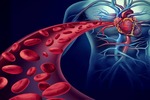
Essentials of Healthcare
Anatomy and Physiology is a vital part of most healthcare post-secondary education programs. The Essentials of Healthcare is a medical focused anatomy course addressing the physiology of each body system, along with the investigation of common diseases, disorders, and emerging diseases. The prevention of disease and the diagnosis and treatment that might be utilized are addressed, along with medical terminology related to each system. Course provides an opportunity to demonstrate technical skills that enforce the goal of helping students make connections between medical procedures and the pathophysiology of diseases and disorders.
Required: No / Elective
Prerequisites: None
Credit: 1.0
Grades: 10-12Course #: 25.44000
*Course meets fourth science requirement by the Board of Regents, and an Anatomy credit is awarded at successful completion of this course.

Allied Health & Medicine
This course is designed to offer students the opportunity to become effective and efficient multi-skilled healthcare providers as they develop a working knowledge of various allied health opportunities. Students focusing on a career path in the healthcare field may apply classroom/lab knowledge and skills in the clinical setting as they participate in direct or simulated client care. The curriculum allows instructors to provide options for classroom/student growth opportunities in area(s) of interest to the student. These options may be determined by community need, available resources, and/or student interest, etc. Instructors may select which classroom content standards 1-14 best meet his/her individual classroom needs in addition to the required clinical/capstone project to equal total class time available for the course.
Required: No / Elective
Prerequisites: None
Credit: 1.0
Grades: 11-12Course #: 25.43700
Sports & Entertainment Marketing 
Marketing Principles
A foundational course that addresses all the ways in which marketing satisfies consumer and business needs and wants for products and services. Students develop a basic understanding of Employability, Foundational and Business Administration skills, Economics, Entrepreneurship, Financial Analysis, Human Resources Management, Information Management, Marketing, Operations, Professional Development, Strategic Management, and Global Marketing strategies. Instructional projects with real businesses, work-based learning activities including School-Based Enterprises, and DECA application experiences are incorporated.
Required: No / Elective
Prerequisites: None
Credit: 1.0
Grades: 9-12Course #: 08.47400

Introduction to Sports & Entertainment Marketing
Introduces students to the major segments of the Sports & Entertainment Industry and the social/economic impact the industry has on the local, state, national, and global economies. The products and services offered to consumers and the impact of marketing on these products and services are examined.
Required: No / Elective
Prerequisites: None
Credit: 1.0
Grades: 10-12Course #: 08.47800
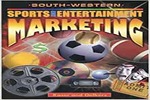
Advanced Sports & Entertainment Marketing
Provides students opportunities to develop managerial and analytical skills and deepen their knowledge in sports/entertainment marketing. Topics include: Marketing-Information Management, Selling, Pricing, Publicity, Public Relations, Sales Promotion, Management of Promotion, Product Mix, Positioning, and Marketing Planning.
Required: No / Elective
Prerequisites: None
Credit: 1.0
Grades: 11-12Course #: 08.48500
Work-Based Learning 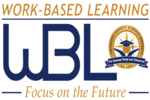
Eligible students must…
- Be at least 16 years old and in the 11th or 12th grade.
- Meet program admission requirements related to transportation, GPA, attendance, and discipline.
- Have completed or be currently enrolled in an advanced level CTAE course and be placed on a job site that aligns with their career goals and courses of study.
Required: No / Elective
Prerequisites: None
Credit: 1.0
Grades: 11-12Course #:
-
Graduation Requirements Ⅴ. CTAE, Modern Languages/Latin
or Fine Arts: 3 Units RequiredStudents are required to have a combination of 3 credits in one or more of these three areas: CTAE, Fine Arts, or Modern Language. Updated 2.15.22

